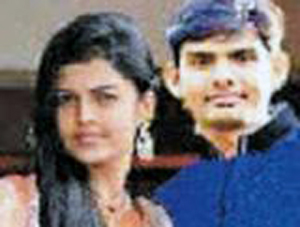Mandya, Apr 12: A group of extremists claiming to be “saviors” of Hinduism staged a protest here on Tuesday, opposing a Hindu family's decision to get their daughter married to a Muslim man, calling it an act of "love jihad".
The protesters shouted slogans of 'love jihad' outside the girl's house, while alleging that religious conversion was happening in the name of love and marriage.
The duo, both MBA graduates and whose fathers were childhood friends, have been in love with each other for the last 12 years and are scheduled to get married soon in Mysuru with consent of both their families, according to members of both families.
Alleging that "love jihad" cases are on rise, one of the protesters demanded to know why the girl was being trained on Islamic practices and Quran if it was a true love marriage. The protesters left the place only after police intervened.
Rejecting the protesters' charges, the girl said, "Even if I get married to a Hindu guy, I have to practise traditions of his family. I'm in love with him and I'm getting happily married with the consent of our parents." Her father Dr Narendra Babu, a paediatrician, said his daughter's happiness was "more" important to him and religion does not matter at all.
"We have never given importance to religion or caste. We did not know about it. They were in love for last 12 years. First even I thought it would be difficult as the guy is a Muslim, but later I learnt he is the son of my childhood friend. They are good people," he said.
The boy's father Mukhtar Ahmed said there are no differences between the families on the issue of religion and the family has happily consented to the marriage.
"The girl and boy both are not uneducated, they are MBA graduates. The girl has been abroad also. There is nothing called love jihad. They both were in love and now they are getting married with our consent and blessings," he said.





Comments
If Constitution agrees then why these anti national chaddeez are against it. Going against our constitutional laws ..chaddeezz are anti nationals...find an island and throw these chaddeezz there and call it bajrangistan....and let them die saying bharath Mata ki jai...
people from all part of world, COMMUNITY & CAST are keen to know about Muslims lifestyle, our culture & our marriages because we are the center of attraction.
There is no compulsion in religion - Nobody is FORCING HER. That is the TRUTH our ISLAM teaches.
Come on Cheddis : Before U protest without knowledge. U too try to read QURAN. there is a special message to YOU guys, who R trying to make troubles in the society. But there is also forgiveness too for those who repent.
Y dont U read QURAN? When U read, U will come to know Y U guys are there in aggression... and anger without TRUE knowledge of any incident...
Y are U acting like DONKEYs as per YOUR cheddi leaders instructions.
Dont U use YOUR God given intellectual. Please come on guys . Use YOur intellect and read QURAN to understand better, who is behind such HATE that U guys are spreading.
CHADDI GALIGE BURNOL BHAGYA ....HEHEHEHE
Ma Sha Allah.. May Allah bless you both and we wish you a happy married life.. stay blessed and be happy always.. Prove the chaddis that they are wrong!
Maaasha'Allah... may Allah bless the couple with lots n lots of happiness....baarakallahu lakum wa baaraka alaika wa jama'ah bainakuma fee khairin aafiya'h
Parents of both families agreed, Constitution agrees, but Sanghi goons who are anti-constitution have problems. We Muslims know that there is no such thing as love-jihad in Islam and none of the Muslims ever practice such an immorality in the name of Islam to cause trouble. Neither do sensible Hindus.
May Allah Safeguard the couple and guide them.
BTW, It is Haram for Muslim Man to marry a Polytheist. Hope the boy and his family knows this too.
\ There is no compulsion in religion \" : said the liar"
There is no such a thing like love jihad....its a kind of lies filling in the minds good majority hindus by those protector of hindusm...in reality these so called protectors are the big drunkards....criminals....
Add new comment